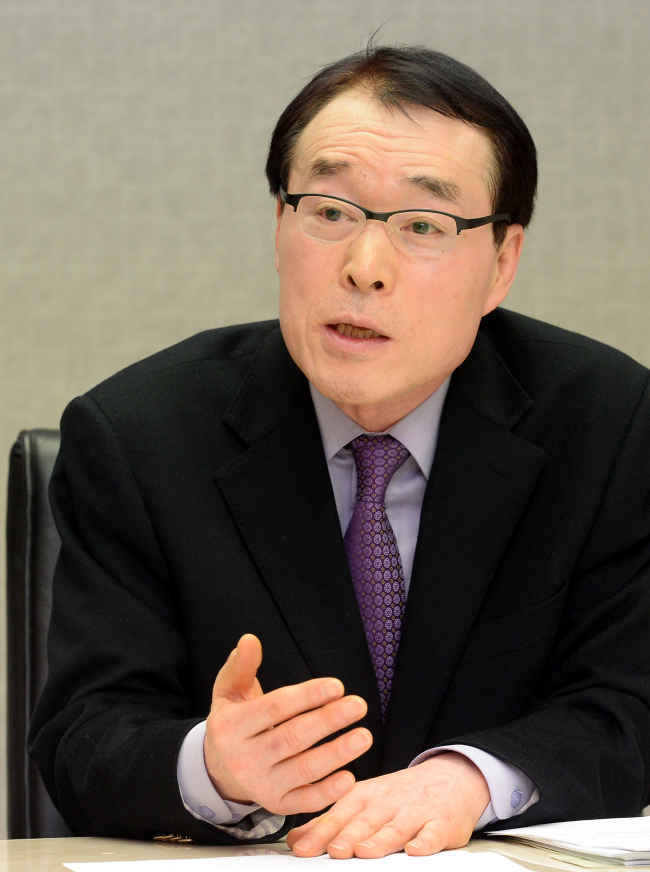BKL sets new precedent for law firms’ social service
By Korea HeraldPublished : Feb. 3, 2014 - 20:01
Law firms have a duty to change society for the better, says Ra Cheon-soo, a representative partner of Bae, Kim and Lee LLC.
Ra says that the country’s legal industry has been held back from fulfilling such duties by its own structure, despite the good intentions of legal professionals.
“Despite their original intentions, there are elements that hinder the realization of such dreams and intentions,” Ra said, saying that all legal professionals begin their careers with the intention to contribute to society.
“If there is a systematic support provided by the firm for such activities, there will be joy in working as a lawyer.”
Ra says that the country’s legal industry has been held back from fulfilling such duties by its own structure, despite the good intentions of legal professionals.
“Despite their original intentions, there are elements that hinder the realization of such dreams and intentions,” Ra said, saying that all legal professionals begin their careers with the intention to contribute to society.
“If there is a systematic support provided by the firm for such activities, there will be joy in working as a lawyer.”

According to Ra, who began his career as a legal professional as a judge in 1977, large law firms with the means to support long hours of pro bono work only began to appear in the 1990s.
In line with the company’s management philosophy of “professional responsibility,” BKL has been setting new precedents in the industry.
In 2002 the firm established the Pro Bono Committee headed by the representative partner. The committee is divided into six subcommittees that oversee a range of topics including those concerning refugees, North Korea and North Korean defectors, and social enterprises.
Building up from the committee, the Dongcheon Foundation was launched in 2009, making BKL the first local law firm to establish an organization dedicated to public interest projects.
The foundation was also the first in Korea to employ a full-time lawyer to serve as its “pro bono manager,” who coordinates related matters.
At present, the foundation has five full-time lawyers, three of whom are fellows.
“The fellowship system allows lawyers to work for about two years at Dongcheon and then go on to work as public interest lawyers elsewhere,” Ra said.
He added that Kim Ye-won, a pro bono human rights lawyer for the disabled who works for Seoul City Government, began at the foundation.
The relationship between the foundation and the public interest lawyers it produced, however, does not end there.
“(The foundation) provides partial financial support as working conditions (for public interest lawyers) are poor until they settle in to their roles. That is how systematic and stable the operations of the Pro Bono Committee are.”
Although the company has made significant headway in the field, Ra says that the conditions in Korea’s legal industry are unfavorable for pro bono work, despite the Attorney-at-Law Act recommending at least 20 hours of such activities each year.
Using its scale to aid related activities, BKL allows its lawyers to carry out up to 140 hours of pro bono work each year, with possibility of extension.
Aided by the company policy, taking on pro bono work has gradually become almost the norm at BKL, Ra says.
Dongcheon Foundation’s 2013 social responsibility report shows that 224 or 77.5 percent of BKL lawyers took on pro bono work in that year.
Together, the lawyers worked more than 12,000 hours on public interest cases, which would have resulted in 5.9 billion won ($5.4 million) in fees. The average for each BKL lawyer comes to 39.2 hours, nearly double that recommended by law.
Although many large law firms now take a more serious approach to social responsibility, one area in which BKL stands out is in representing those seeking refugee statuses in Korea.
Last year, the company took on 23 cases of refugee statuses being denied. Four cases were closed in their clients’ favor, while 10 are still ongoing.
It is not, however, just any case the BKL lawyers take on.
Ra says that when refugee-related cases are deferred to BKL, those with higher chances of winning are selected to build up precedents of successful cases in order to aid the firm’s related efforts in the future.
The company’s refugee-related works have led to developments that go beyond individual cases.
“In carrying out refugee-related suits, we requested the Seoul Administrative Court to make specialized courtrooms, and they were made. BKL’s social responsibility program had changed the system,” Ra said.
“A law firm consists of experts from a variety of fields including tax, accounting and law, so there is a synergy effect in making a positive impact on society,” Ra said.
By Choi He-suk (cheesuk@heraldcorp.com)
-
Articles by Korea Herald





![[Herald Interview] 'Amid aging population, Korea to invite more young professionals from overseas'](http://res.heraldm.com/phpwas/restmb_idxmake.php?idx=644&simg=/content/image/2024/04/24/20240424050844_0.jpg&u=20240424200058)












![[KH Explains] Korean shipbuilding stocks rally: Real growth or bubble?](http://res.heraldm.com/phpwas/restmb_idxmake.php?idx=652&simg=/content/image/2024/04/25/20240425050656_0.jpg&u=)

